
Access
Research
Network
|
|
Access |
ARN-Announce is the on-line announcement and information service of Access Research Network. ARN generates announcements to the current ARN Announce list as information becomes available. You have received this message because your email address was submitted to this list. Subscription and Unsubscription information is at the end of this message.
Click here for a text-only version of this document.
IN THIS ARN-ANNOUNCE:
New Video: An Evening with Phillip E.
Johnson and Friends
Friends and foes spent an evening at the recent Biola ID conference
toasting and roasting Phillip Johnson and we've got it all on
video including remarks by Lee Strobel, Bill Dembski, Steve Meyer,
Tom Woodward, Jed Macosko, John Mark Reynolds, Will Provine, and
Michael Ruse.
CD Video Set: The Best of the 8th European
Creationist Congress
Although the challenge to Darwinism is not as fierce in Europe
as it is in the U.S., there are a growing number of scientists
who are speaking out against naturalism and in favor of design,
as evidenced by the 8th European Creationist Congress held August
15-20, 2003 in Sweden. This CD set brings you some of the best
presentations and top speakers from that event.
New Video Study Guide: Icons of Evolution
Student Study Guide
The Icons of Evolution Documentaryhas quickly become an
ARN best seller. Now available as a companion to the video, the
Icons of Evolution Student Study Guide further illuminates
the concepts originated by Jonathan Wells in his popular book,
Icons of Evolution. This is a great tool for facilitating
individual study or classroom discussion.
New Book: The Integration of Faith and
Learning: A Worldview Approach
Students of faith often find their beliefs undermined at the secular
university where professors frequently teach from the worldview
perspectives of philosophic naturalism or postmodernism. In this
new book Richard Harris, who has taught at the university for
25 years, provides students with the tools needed to integrate
their faith and their quest for knowledge in the university environment.
From Darwin to Hitler: Evolutionary
Ethics, Eugenics, and Racism in Germany
Richard Weikart convincingly makes the disturbing argument that
Hitler built his view of ethics on Darwinian principles rather
than nihilistic ones. From Darwin to Hitler is a provocative
yet balanced work that should encourage a rethinking of the historical
impact that Darwinism had on the course of events in the twentieth
century.
New Book: Uncommon Dissent: Intellectuals
Who Find Darwinism Unconvincing
Recent years have seen the rise to prominence of ever more sophisticated
philosophical and scientific critiques of the ideas marketed under
the name of Darwinism. In Uncommon Dissent, mathematician
and philosopher William A. Dembski brings together essays by leading
intellectuals who find one or more aspects of Darwinism unpersuasive.
Wired for Much More than Sound-Neurons
and How They Work - Part 1
In his latest "Exercise your Wonder" column, Dr. Howard
Glicksman begins the first of many columns on the neuromuscular
system, the only system in the body in which we have some measure
of control.
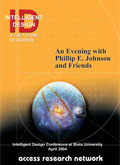 The
tip of the Intelligent Design (ID) wedge, Dr. Phillip E. Johnson,
was given a tribute during the 2004 Biola Conference "Intelligent
Design and the Future of Science". In attendance on the "panel"
were close associates and familiar foes. Lee Strobel, well-known Christian
apologist, spoke of the insights he received from leaders in the writing
of his recent book The Case for the Creator. Dr. Willliam Dembski,
Associate Research Professor at Biola University, talked fondly of
Phil as being the pioneer of the ID movement. Dr. William Provine,
the Charles A. Alexander Professor of Biological Sciences at Cornell
University, and an atheist who frequently has debated Dr. Johnson,
described Phil as a genuinely likeable man and "twice as smart
as me." Dr. Michael Ruse, Professor of Philosophy and Zoology
at Florida State University, dubbed as the "delightful detractor",
had praise for Phil, and also surprised all by taking off his coat,
tie, and shirt and revealing his Darwin T-shirt, to the delight of
the crowd. All was in good humor.
The
tip of the Intelligent Design (ID) wedge, Dr. Phillip E. Johnson,
was given a tribute during the 2004 Biola Conference "Intelligent
Design and the Future of Science". In attendance on the "panel"
were close associates and familiar foes. Lee Strobel, well-known Christian
apologist, spoke of the insights he received from leaders in the writing
of his recent book The Case for the Creator. Dr. Willliam Dembski,
Associate Research Professor at Biola University, talked fondly of
Phil as being the pioneer of the ID movement. Dr. William Provine,
the Charles A. Alexander Professor of Biological Sciences at Cornell
University, and an atheist who frequently has debated Dr. Johnson,
described Phil as a genuinely likeable man and "twice as smart
as me." Dr. Michael Ruse, Professor of Philosophy and Zoology
at Florida State University, dubbed as the "delightful detractor",
had praise for Phil, and also surprised all by taking off his coat,
tie, and shirt and revealing his Darwin T-shirt, to the delight of
the crowd. All was in good humor.
Others who paid tribute to Dr. Johnson included Dr. Stephen C. Meyer, Director and Senior Fellow of the Center for Science and Culture at the Discovery Institute, Dr. Thomas Woodward, co-author of Doubts About Darwin, a History of Intelligent Design, and Dr. Jed Mocosko, biophysicist at Wake Forest University. Dr. John Mark Reynolds, Founder and Director of the Torrey Honors Program at Biola University gave an eloquent address, dubbing Dr. Johnson as the "Wizard from Berkeley." Dr. Craig Hazen, Director of the Masters of Arts program in Christian Apologetics at Biola University announced a new Biola award, named the Phillip E. Johnson Award for Liberty and Truth. The first recipient was, of course, Dr. Johnson, who has done much in liberating minds from the Darwinian paradigm, and pointing those minds to the Truth of reality.
To order your copy of An Evening with Phillip E. Johnson and Friends video DVD go to http://www.arn.org/arnproducts/php/video_show_item.php?id=30
 Although
the challenge to Darwinism is not as fierce in Europe as it is in
the U.S., there are a growing number of scientists who are speaking
out against naturalism and in favor of design, as evidenced by the
8th European Creationist Congress held August 15-20, 2003 in Sweden.
This CD set brings you some of the best presentations and top speakers
from that event. Although Dr. Paul Nelson can not be counted among
the European scientists, we are pleased to be able to include his
talk at that event as his first video lecture available from ARN.
Although
the challenge to Darwinism is not as fierce in Europe as it is in
the U.S., there are a growing number of scientists who are speaking
out against naturalism and in favor of design, as evidenced by the
8th European Creationist Congress held August 15-20, 2003 in Sweden.
This CD set brings you some of the best presentations and top speakers
from that event. Although Dr. Paul Nelson can not be counted among
the European scientists, we are pleased to be able to include his
talk at that event as his first video lecture available from ARN.
This exciting new format has been created with Microsoft Producer 2 and Windows Media 9 which allows us to provide video lecture material at a lower cost than the standard DVD format. These CDs can be viewed on a PC running Windows 98, ME, 2000 or XP, or a MAC running OS X. The video lecture plays in a small window in the upper corner of your screen while the Power Point slide the speaker is talking from shows with great resolution in the center of your screen. The viewer can select any slide in the presentation and jump to that section of the lecture.
The following products are required to run these CDs: For the PC, Microsoft Windows Media Player 7.0 or later. Windows Media Player 9 Series or later is recommended to optimize presentation playback. Microsoft Internet Explorer 5.0 or later, or Netscape Navigator 7.0 or later. For the Mac running OS X v10.2 or later, Windows Media Player for Mac OS X , Internet Explorer 5.2.2 (or later) for Mac.
To order the 11 CD set and save 45% over the individual title prices, go to http://www.arn.org/arnproducts/cd/cd001.htm
By Roger DeHart
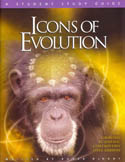 The
Icons of Evolution Documentary (ARN
#V025) has quickly become an ARN best seller. Now available as
a companion to the video, the Icons of Evolution Student Study
Guide further illuminates the concepts originated by Dr. Jonathan
Wells in his popular book, Icons of Evolution (ARN
#B038).
The
Icons of Evolution Documentary (ARN
#V025) has quickly become an ARN best seller. Now available as
a companion to the video, the Icons of Evolution Student Study
Guide further illuminates the concepts originated by Dr. Jonathan
Wells in his popular book, Icons of Evolution (ARN
#B038).
Arranged in seven sections that mirror the seven icons dissected in the video, the Icons Study Guide presents a short discussion of each icon, as well as learning goals and study questions within each sub-section. Research notes are also included at the end of the guide.
The Icons Study Guide is available as a stand-alone item, for those who already own the Documentary, or as part of the Icons of Evolution Student Study Kit (ARN #V025SKS) and the larger Icons of Evolution Study Kit with Text (ARN #V025SK)
Many parents and scholars are asking, are students learning the whole truth about Darwin's theory of evolution? According to a growing number of scientists, the answer is no. Now you can thoroughly explore this fascinating new conflict over evolution in the classroom, and educate yourself with the truth about the "Icons of Evolution" you may have taken for granted!
To order the new Icons of Evolution Student Study Guide go to: http://www.arn.org/arnproducts/php/book_show_item.php?id=76
By Robert A. Harris
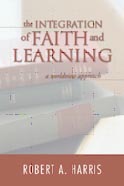 One
hundred years ago getting a liberal education was a good thing. It
meant developing the ability to understand and argue every position
on an issue and then choosing the best one based on a logical, rational
decision instead of prejudice, ignorance, or blind assumptions. However,
with the secular academic community adopting naturalism (in the sciences)
and postmodernism (in the liberal arts), the university often has
its own built-in prejudice, and a liberal education today is frequently
equated with efforts to disavow students of any theistic worldview
they may bring along with their quest for knowledge.
One
hundred years ago getting a liberal education was a good thing. It
meant developing the ability to understand and argue every position
on an issue and then choosing the best one based on a logical, rational
decision instead of prejudice, ignorance, or blind assumptions. However,
with the secular academic community adopting naturalism (in the sciences)
and postmodernism (in the liberal arts), the university often has
its own built-in prejudice, and a liberal education today is frequently
equated with efforts to disavow students of any theistic worldview
they may bring along with their quest for knowledge.
This is an issue that has concerned Richard Harris as he has taught at the university level for the past 25 years and he has written an excellent book that should assist students of faith in approaching the university world with their eyes wide open. The book is entitled The Integration of Faith and Learning: A Worldview Approach. Harris compares and contrasts the worldviews of philosophic naturalism, postmodernism, and Christian theism. Throughout the book, emphasis is placed on helping students develop the practical skills needed to evaluate knowledge claims and to integrate all knowledge into a unified whole. A critical thinking approach is encouraged where faith and fact inform each other in a positive way, rather than the confrontational approach frequently found in the university.
There is a wide selection of books available on worldview issues today, but I find this one particularly helpful for college students since the author has spent his career in that environment. The questions at the end of each chapter and the additional bibliography and web references at the end of the book, make this an ideal resource for personal reflection and group discussion. Harris is currently teaching a course based on the book and posting additional discussion questions to his website related to that effort (http://www.virtualsalt.com/int/).
Although the book is written for Christians, other students of other faiths will also find the worldview approach helpful in the university setting, as will professors who teach from a postmodern or naturalistic worldview and desire to understand and communicate more effectively with their faith-oriented students.
When I was a college student getting my degree at the University of California 25 years ago, it was similar books by James Sire and Francis Schaeffer that helped me integrate my own faith with the secular academic environment. Since I have a 17 year old son going off to the university to study math and music in September, we plan to spend some time this summer reading through Harris's book together and grappling with the questions at the end of each chapter. I can't give you a better recommendation than that.
Endorsements:
Worldview survey books abound, but what sets this one apart and makes
it essential is its treatment of how knowledge functions and is propagated
"in the real world." It is insufficient to merely categorize
thinkers or their views. Students need to reckon with how certain
claims are advanced and accepted regardless of their merits. Harris'
book teaches a savvy form of skepticism that still exudes a love of
truth and values the life of the mind. Highly recommended for home
schoolers, youth workers, campus ministers, college students, professors,
and anyone concerned with training Christian students in how to engage
the world of ideas.
-Patrick Rist, Christian Leadership Ministries' Academic Initiative
About the Author:
Robert A. Harris has taught courses in writing, literature, and critical
thinking at the college and university level for more than 25 years.
He holds the Ph.D. from the University of California at Riverside.
To view the table of contents or order The Integration of Faith and Learning go to: http://www.arn.org/arnproducts/php/book_show_item.php?id=77
By Richard Weikart
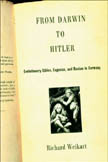 In
this compelling and painstakingly researched work of intellectual
history, Richard Weikart explains the revolutionary impact Darwinism
had on ethics and morality. He demonstrates that many leading Darwinian
biologists and social thinkers in Germany believed that Darwinism
overturned traditional Judeo-Christian and Enlightenment ethics, especially
those pertaining to the sacredness of human life. Many of these thinkers
supported moral relativism, yet simultaneously exalted evolutionary
"fitness" (especially in terms of intelligence and health)
as the highest arbiter of morality. Weikart concludes that Darwinism
played a key role not only in the rise of eugenics, but also in euthanasia,
infanticide, abortion, and racial extermination, all ultimately embraced
by the Nazis. He convincingly makes the disturbing argument that Hitler
built his view of ethics on Darwinian principles rather than nihilistic
ones. From Darwin to Hitler is a provocative yet balanced work
that should encourage a rethinking of the historical impact that Darwinism
had on the course of events in the twentieth century.
In
this compelling and painstakingly researched work of intellectual
history, Richard Weikart explains the revolutionary impact Darwinism
had on ethics and morality. He demonstrates that many leading Darwinian
biologists and social thinkers in Germany believed that Darwinism
overturned traditional Judeo-Christian and Enlightenment ethics, especially
those pertaining to the sacredness of human life. Many of these thinkers
supported moral relativism, yet simultaneously exalted evolutionary
"fitness" (especially in terms of intelligence and health)
as the highest arbiter of morality. Weikart concludes that Darwinism
played a key role not only in the rise of eugenics, but also in euthanasia,
infanticide, abortion, and racial extermination, all ultimately embraced
by the Nazis. He convincingly makes the disturbing argument that Hitler
built his view of ethics on Darwinian principles rather than nihilistic
ones. From Darwin to Hitler is a provocative yet balanced work
that should encourage a rethinking of the historical impact that Darwinism
had on the course of events in the twentieth century.
Endorsements:
Richard Weikart's outstanding book shows in sober and convincing detail
how Darwinist thinkers in Germany had developed an amoral attitude
to human society by the time of the First World War, in which the
supposed good of the race was applied as the sole criterion of public
policy and 'racial hygiene'. Without over-simplifying the lines that
connected this body of thought to Hitler, he demonstrates with chilling
clarity how policies such as infanticide, assisted suicide, marriage
prohibitions and much else were being proposed for those considered
racially or eugenically inferior by a variety of Darwinist writers
and scientists, providing Hitler and the Nazis with a scientific justification
for the policies they pursued once they came to power.
-- Dr. Richard Evans, Professor of Modern History, University of
Cambridge, and author of The Coming of the Third Reich
This is one of the finest examples of intellectual history I have
seen in a long while. It is insightful, thoughtful, informative, and
highly readable. Rather than simply connecting the dots, so to speak,
the author provides a sophisticated and nuanced examination of numerous
German thinkers of the late nineteenth and early twentieth centuries
who were influenced to one degree or another by Darwinist naturalism
and their ideas, subtly drawing both distinctions and similarities
and in the process telling a rich and colorful story.
-- Ian Dowbiggin, Professor of History at the University of Prince
Edward Island and author of A Merciful End: The Euthanasia Movement
in Modern America
This is an impressive piece of intellectual and cultural history--a
well-researched, clearly presented argument with good, balanced, fair
judgments. Weikart has a thorough knowledge of the relevant historiography
in both German and English."
-- Alfred Kelly, Edgar B. Graves Professor of History, Hamilton
College, and author of The Descent of Darwin: The Popularization
of Darwinism in Germany, 1860-1914
This is truly a well-crafted work of intellectual history, and one
directly relevant to some of the most consequential ethical discussions
of our present time. Christians and all people of good will would
do well to ponder these arguments, recognizing how easily the best
and brightest can commit the worst and darkest under the progressive
banner of biological "health and fitness." The book should
provoke much debate and discussion, not only among historians but
among ethicists and scientists too.
--Thomas Albert Howard, Associate Professor of History, Gordon
College, author of Protestant Theology and the Making of the Modern
German University (forthcoming)
The philosophy that fueled German militarism and Hitlerism is taught
as fact in every American public school, with no disagreement allowed.
Every parent ought to know this story, which Weikart persuasively
explains.
--Phillip Johnson, Professor Emeritus of Law, University of California,
Berkeley, and author of Darwin on Trial and Reason in the
Balance
If you think moral issues like infanticide, assisted suicide, and
tampering with human genes are new, read this book. It draws a clear
and chilling picture of the way Darwinian naturalism led German thinkers
to treat human life as raw materials to be manipulated in order to
advance the course of evolution. The ethics of Hitler's Germany were
not reactionary; they were very much "cutting edge" and
in line with the scientific understanding of the day. Weikart's implicit
warning is that as long as the same assumption of Darwinian naturalism
reigns in educated circles in our own day, it may well lead to similar
practices.
--Nancy Pearcey, co-author of The Soul of Science and How
Now Shall We Live
Richard Weikart's masterful work offers a compelling case that the
eugenics movement, and all the political and social consequences that
have flowed from it, would have been unlikely if not for the cultural
elite's enthusiastic embracing of the Darwinian account of life, morality,
and social institutions. Professor Weikart reminds us, with careful
scholarship and circumspect argument, that the truth uttered by Richard
Weaver decades ago is indeed a fixed axiom of human institutions:
"ideas have consequences."
--Francis J. Beckwith, Associate Director, J.M. Dawson Institute
of Church-State Studies, and Associate Professor of Church-State Studies,
Baylor University
About the Author
Richard Weikart is an associate professor of modern European history
at California State University, Stanislaus. He has lived in Germany
over five years, including one year on a Fulbright Fellowship. He
has published two previous books, including Socialist Darwinism:
Evolution in German Socialist Thought from Marx to Bernstein (1999),
as well as articles in German Studies Review, Journal of
the History of Ideas, Isis, European Legacy, and
History of European Ideas.
To view the table of contents or order From Darwin to Hitler go to:
http://www.arn.org/arnproducts/php/book_show_item.php?id=75
William A. Dembski, Editor
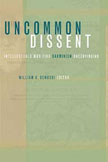 Recent
years have seen the rise to prominence of ever more sophisticated
philosophical and scientific critiques of the ideas marketed under
the name of Darwinism. In Uncommon Dissent, mathematician and
philosopher William A. Dembski brings together essays by leading intellectuals
who find one or more aspects of Darwinism unpersuasive. As Dembski
explains, Darwinism has gathered around itself an aura of invincibility
that is inhospitable to rational discussionto say the least: "Darwinism,
its proponents assure us, has been overwhelmingly vindicated. Any
resistance to it is futile and indicates bad faith or worse."
Indeed, those who question the Darwinian synthesis are supposed, in
the famous formulation of Richard Dawkins, to be ignorant, stupid,
insane, or wicked.
Recent
years have seen the rise to prominence of ever more sophisticated
philosophical and scientific critiques of the ideas marketed under
the name of Darwinism. In Uncommon Dissent, mathematician and
philosopher William A. Dembski brings together essays by leading intellectuals
who find one or more aspects of Darwinism unpersuasive. As Dembski
explains, Darwinism has gathered around itself an aura of invincibility
that is inhospitable to rational discussionto say the least: "Darwinism,
its proponents assure us, has been overwhelmingly vindicated. Any
resistance to it is futile and indicates bad faith or worse."
Indeed, those who question the Darwinian synthesis are supposed, in
the famous formulation of Richard Dawkins, to be ignorant, stupid,
insane, or wicked.
The hostility of dogmatic Darwinians like Dawkins has not, however, prevented the advent of a growing cadre of scholarly critics of metaphysical Darwinism. The measured, thought-provoking essays in Uncommon Dissent make it increasingly obvious that these critics are not the brainwashed fundamentalist buffoons that Darwinism's defenders suggest they are, but rather serious, skeptical, open-minded inquirers whose challenges pose serious questions about the viability of Darwinist ideology. The intellectual power of their contributions to Uncommon Dissent is bracing.
About the Author
William A. Dembski is associate research professor in the conceptual
foundations of science at Baylor University and a senior fellow with
Discovery Institute's Center for Science and Culture in Seattle. The
author of numerous articles on intelligent design and mathematical,
philosophical, and theological matters, his books include The Design
Inference: Eliminating Chance through Small Probabilities and
No Free Lunch: Why Specified Complexity Cannot Be Purchased without
Intelligence.
Recommendations
"I am delighted to strongly recommend William Dembski's new book
Uncommon Dissent. The scientific and philosophical underpinnings
of the origins debate need to be better understood by the intellectual
public, and Dembski's book is exceptionally helpful in this regard."
- Henry F. Schaefer III, Graham Perdue Professor of Chemistry and
Director, Center for Computational Chemistry, University of Georgia
"I salute the intellectual honesty and courage of all the contributors
who participated in writing Uncommon Dissent. These dissenters
masterfully bring to light the flaws and fallacy of Darwinism, a secular
ideology dogmatically rooted in naturalistic philosophy. This illuminating
book constitutes another sign that a new scientific revolution is
coming, one that will ultimately lead to the recognition of the quintessential
role of intelligent causation in evolution and mark the end of metaphysical
materialism."
- Mario Beauregard, Department of Psychology and Neuroscience Research
Center, Université de Montréal
"Darwin, a free thinker who dared make far-reaching conclusions
based on observations, would have been dismayed to see the petrified
doctrine his brainchild has become. Must we admit that all organisms
are nothing but watery Turing machines evolved merely by a sequence
of accidents favored by nature? Or do we have the intellectual freedom
to rethink this fundamental issue, as is done in this book? I'm sure
Darwin would have been glad to contribute an essay to this interesting
and fearless collection, a collection every open-minded scientist
and layman alike will benefit from reading."
- Eshel Ben Jacob, Maguy-Glass Chair in Physics of Complex Systems,
Tel Aviv University
To view the table of contents or order Uncommon Dissent go to: http://www.arn.org/arnproducts/php/book_show_item.php?id=78

In the time that it takes for you to read this paragraph; your automatic pacemaker has stimulated your heart to contract several times; a message from your brainstem has traveled through various nerves to stimulate your diaphragm to make you breathe at least once; and the nerves that control your eye muscles have allowed you to scan and focus on what you have just read. Pretty amazing isn't it?
But there's much more going on than that. For if you are like most people, you're probably sitting at your computer right now, trying to decide whether to read the whole column now or print it off. In order to be able to use your mouse or keyboard to scroll down, your brain would have to be sending the proper messages to the right muscles. And, for you to be able to sit erect in your chair, your spinal muscles would have to be working in a coordinated fashion, orchestrated by the brain. And finally, as you move your head up and down and left or right, as you search for your mouse and decide to turn on your copier, you wouldn't be able to keep your position in space if it weren't for the properly working balance organs in your ears, under the control of the brain.
To read the rest of Dr. Glicksman's latest web column on design in the human body go to:
All of the ARN products can be ordered through our web catalog store with secure credit card ordering. There you will find a description of each product and you may add as many products as you would like to the electronic shopping cart. The suggested donation for each item includes USPS Media Mail for North American orders, which typically arrive in 5-7 days. Overseas prices include Foreign Surface shipping which may take 4-8 weeks. For faster shipping please include an additional donation and request either USPS Priority or Foreign Air. If you provide your email address, you will receive an email receipt of your order. Place your order today online at www.arn.org (click the products links on the top menu bar). If you have any problems or questions, or would rather place your order by phone, call our toll free number at 1-888-259-7102 and our staff will be happy to assist you (or leave your order with our voice mail system if we are out of the office).
ARN-Announce describes many of the upcoming events and new articles, books, videos and other resources on Intelligent Design. Please forward this message to several of your friends and colleagues to let them know about the resources available at Access Research Network (www.arn.org). Back issues of ARN-Announce can be found at www.arn.org/announce.htm
ARN-Announce is written by Dennis Wagner (dwagner@arn.org)
Access Research Network is a non-profit organization dedicated to providing accessible information on science, technology and society issues from an Intelligent Design perspective.
Mailing Address:
Access Research Network
Contact:
(719) 633-1772 voice
(719) 520-1241 fax
(888) 259-7102 toll-free order line
On the web:
www.arn.org
TO ADD YOURSELF TO ARN-ANNOUNCE:
Send an email to "ARN-Announce-request@arn.org".
The body of the message should consist of the word "SUBSCRIBE" and
nothing else. Or visit the web page at www.arn.org/announce.htm
and select Subscribe and enter your email address. You will receive a confirmation
email indicating your name has been submitted to the list. Follow the directions
and reply to the email and your email address will be added to the ARN-ANNOUNCE
list.
TO REMOVE YOURSELF FROM ARN-ANNOUNCE:
Send an email to "ARN-Announce-request@arn.org".
The body of the message should consist of the word "UNSUBSCRIBE"
and nothing else. Or visit the web page at www.arn.org/announce.htm
and select Unsubscribe and enter your email address. Your email address
will be automatically removed from this list.
Copyright 2004 Access Research Network. All rights reserved. International copyright secured.
6.30.04